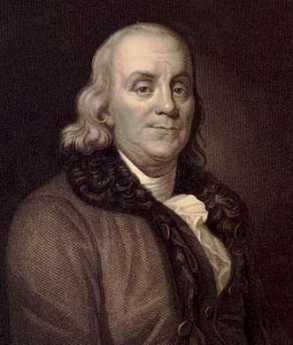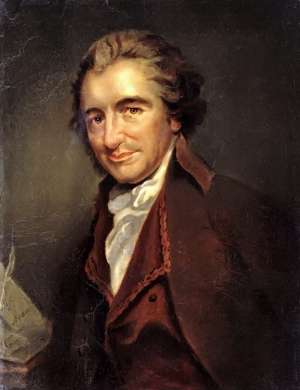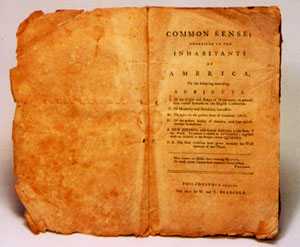Related Topics
Benjamin Franklin
A collection of Benjamin Franklin tidbits that relate Philadelphia's revolutionary prelate to his moving around the city, the colonies, and the world.

Quakers: All Alike, All Different
Quaker doctrines emerge from the stories they tell about each other.
Revolutionary Philadelphia's Patriots
All kinds of people were patriots in 1776, and many of them were all mixed up about what was going on and how they stood. Hotheads in the London Coffee House stirred up about an inoffensive Tea Act, Scotch-Irish come here to escape the British Crown, the local artisan class and the local smuggler class, unexpectedly prospering under non-importation, and the local gentry -- offended to be denied seats in Parliament like other Englishmen. Pennsylvania wavered until Ben Franklin stepped forward with a plan.
Causes of the American Revolution
Britain and its colonies had outgrown Eighteenth Century techniques of governance. Unfortunately, both England and America lacked the sophistication to make drastic changes smoothly.
Quaker Theology
New topic 2016-12-04 04:18:19 description
Interesting Quaker Characters
All alike, but all different.
Tom Paine: Rabble-Rousing Quaker?

|
| Thomas Paine |
Thomas Paine (1737-1809) was born of Quaker parents, which makes him a "birthright" Quaker. Children born into Quaker families are accustomed to the subtleties of speech and behavior of that religious sect, ultimately growing up to be the main nucleus of tradition. Knowing what they are getting into, however, they are more likely to rebel against it than others who, coming to the religion by choice rather than by birthright, are commonly described as "Convinced Friends."
These stereotypes may or may not explain some of Tom Paine's paradoxes. He certainly was not a pacifist, a quietest, or a plain person. He was an important historical figure; Walter A. McDougall, the famous University of Pennsylvania historian, feels the American colonists might have sputtered and complained about Royal rule for decades, except for Paine. The American Revolution happened when it happened because Tom Paine stirred up a storm.
 |
| Common Sense |
According to the traditional way of telling his story, Tom Paine was a ne'er do well failure in London. He ran into Benjamin Franklin, who advised him to emigrate to America in 1775, and within a year his pamphlet called ""Common Sense"" had sold 150,000 copies (some even claim 500,000), galvanizing the public and the Continental Congress into action on July 4, 1776. George Washington read Paine's writings to his troops on the eve of the Battle of Trenton. After that, Paine got mixed up with the French Revolution, and apparently became a severe alcoholic, proclaiming atheism all the way. Although Thomas Jefferson remained friendly to the end, Benjamin Franklin essentially told him to go leave him alone, and Washington would cross the street to avoid him. According to the usual line, Tom Paine was a big-mouthed rabble-rouser and a drunk, who traveled the world looking to stir up revolutions.
However, that cannot possibly be a fair recounting of the whole story. Thomas Alva Edison, whose opinion certainly counts for something, regarded Tom Paine as one of the greatest American inventors, creating the first steel bridge, the first hollow candle, and the principle of central drought in heating. Paine early became a close friend of the Hicks family, the central figures in modern Quakerism; it seems a little unclear how much Tom Paine was reflecting the views of Elias Hicks, and how much Hick site Quakerism can be said to have originated in the thinking of Thomas Paine. Paine was very far from being an atheist. In fact, both he and Hicks believed so fervently in the universality of God that both of them scorned the rituals, paraphernalia, and transparent superstitions of -- religion.
Furthermore, Paine was able to reach the rationalists of The Enlightenment with arguments which cut to the heart of Royalist loyalties. America was too big and too remote to be ruled by a king, particularly one who abused his privileges behind a claim of divine right. William the Conqueror, for example, never denied he was a usurper. One way or another, every king must earn his throne. So, as for feudalism and hereditary aristocracy, what was King George doing with all those German mercenaries? After two centuries of democracy, most Americans are too far from feudalism to appreciate the legitimacy of military meritocracy. Whatever King George was up to, he didn't stand for empowerment of the best and the brightest Englishmen, who in fact might well be opposed to him. If you wanted to get to Virginia aristocrats, Boston sea captains, and Kentucky backwoodsmen, that was exactly the line to take in Common Sense.
Unfortunately, Citizen Tom Paine was a freethinker and couldn't be quiet about it in his later books. He didn't like the way the Old Testament Hebrews hungered for a king. He didn't like the way the New Testament sprinkled miracles on top of unassailable moral principles, and he particularly didn't like the claim that God got an unmarried girl pregnant. He antagonized almost every established religion by proclaiming that no one should make a living from religion. He wrote a book called Age of Reason proclaiming all these freethinking ideas, which struck Ben Franklin as such a stupid thing to do that he would not discuss it, beyond saying that even if he should succeed in convincing people to abandon religion, just imagine how much worse they would probably behave without it. George Washington, who hadn't a trace of intellectualism about him, more accurately portrayed the typical American revulsion at anyone who was so unprincipled as to say such unorthodox things in public. Jefferson distanced himself for political reasons rather than intellectual ones. Franklin thought Paine was a fool. Washington and the rest of the country thought he was a viper.
It would have to be conceded -- by anyone -- that Tom Paine was self-destructive, even sassing Robespierre while in a French prison. How is it such a loose cannon could get the American public off dead center and make the Continental Congress grasp the nettle of revolution, in less than a year? Let's go back to how he came to America in the first place. Franklin sent him.
Then he promptly got a job as editor of the Pennsylvania Gazette, which Franklin had owned for thirty years. And then, in an era when the largest city in America had a population of twenty-five thousand, and the printing presses of the day were able to turn out three or four pages a minute, he sold 150,000 copies of the fifty-page "Common Sense." Who but Franklin, in private partnerships with sixty printers, could have possibly authorized, financed, and printed 150,000 copies of a colonial pamphlet? In order to find that much printing capacity in colonial America, a great deal of other printing had to lose its place in the queue.
Even today, a best-seller is defined as a book that sells 50,000 copies, and it generally takes three years to get it done. In the Eighteenth Century, for an unknown alcoholic to get off the boat and find a publisher for a best seller in a few weeks is hard even to imagine. Unless he had important help.
Originally published: Thursday, May 10, 1990; most-recently modified: Friday, September 20, 2019
| Posted by: Rebecca | Sep 2, 2014 6:36 PM |
| Posted by: Tom | Sep 12, 2013 8:12 AM |